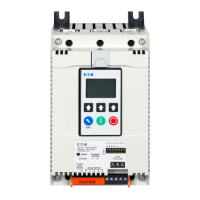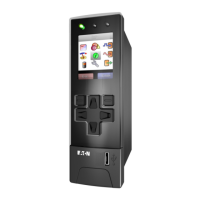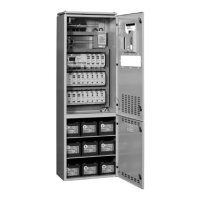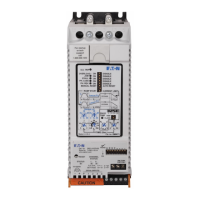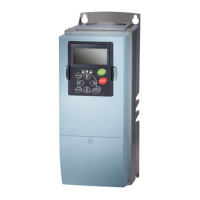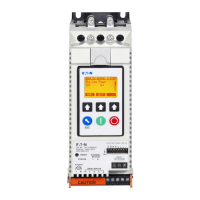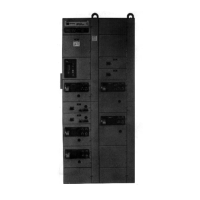S611 Soft Starter MN03902011E—May 2012 www.eaton.com 73
Appendix G—Troubleshooting Guide
This guide is intended to provide the information necessary
to successfully troubleshoot issues that may occur during
the operation of the S611 soft starter. The troubleshooting
sequence and fault codes (FC) are identified below in two
basic groups, New Applications and Existing Installations.
While any fault may occur in either category, experience has
shown that some faults are routinely experienced in one
category. The following information is intended to be a
reference guide to quickly move through the process to
achieve or restore operational status of the soft starter.
New Applications Checklist—During Commissioning
Note: It is not unusual for the S611 soft starter to trip in the
process of being commissioned as it is likely that one
or more parameter(s) setting are not appropriate.
120 Vac power applied
●
Sufficient minimum wattage and voltage value and inrush
capacity
Mains applied
●
All circuit breakers closed, fuses installed—no open fuses
●
All isolation devices closed
●
Verify continuity of mains power to soft starter
Load connected
●
All isolation devices closed
●
Reversing contactors (if used) in proper position
●
Continuity of circuit from soft starter to the motor
Parameter setup—operation mode
●
Motor FLA (A)—Overld trip FLA value (Default—frame size
minimum)
●
Motor rated voltage (Default—480V)
●
Start method—Voltage ramp or current limit (Default—
voltage ramp)
●
Start time—As required (Default—20 seconds)
●
Initial torque—As required (Default—45%)
●
Auto reset mode—As required (Default—Manual)
Parameter setup—protection mode
●
Overld trip class—As required (Default—20)
Parameter setup—operation mode—advanced config
parameters
●
Start control—As required (Default—Level)
●
Relay 1—As required (Default—Run)
●
Relay 2—As required (Default—Faulted)
●
Network communications parameter setup as required
Note: The following fault codes may be experienced during
commissioning of a new installation or a new soft
start into an existing application. Verify all connections
and settings with test equipment as appropriate.
Common commissioning fault codes
●
FC30—Current phase loss
●
FC31—Voltage imbalance
●
FC33—Jam
●
FC20—Overload
●
FC24—Phase reversal
●
FC17—SCR not firing
●
FC25—Start stall
www.comoso.com
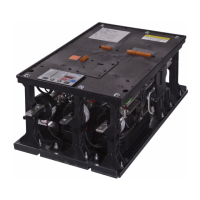
